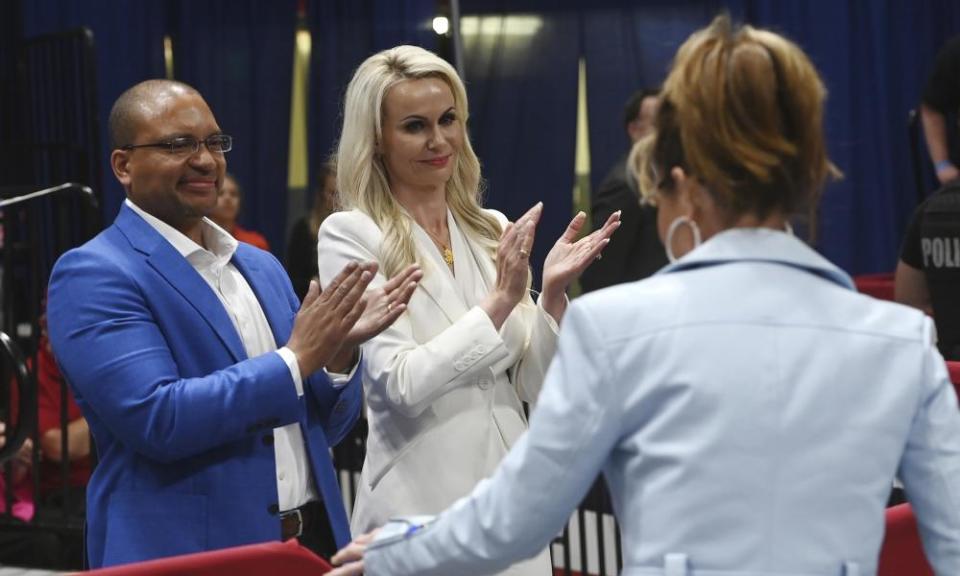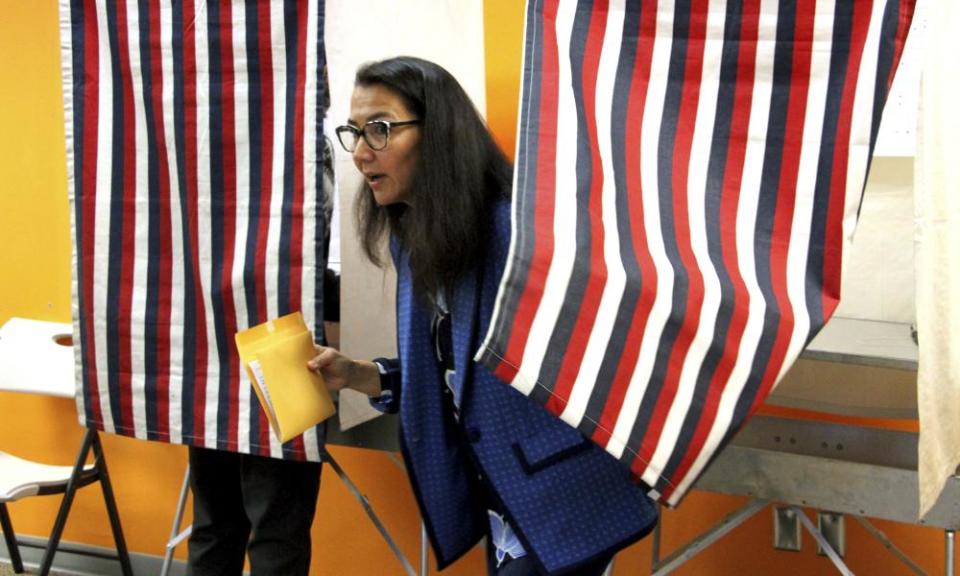Alaska election tests weight of Sarah Palin’s celebrity – and Trump’s sway

- Oops!Something went wrong.Please try again later.
- Oops!Something went wrong.Please try again later.
The lawn signs around town may say “Sarah for Alaska” – but as far as resident David Gober can tell, Sarah Palin “is all for Palin”.
At a coffee shop not far from Palin’s campaign headquarters in Anchorage, Gober, his wife Zelda Marie and a few friends meet up regularly to affably dissect their politics and golf games. The group – like many Alaskans – is skeptical about their former governor’s congressional bid.
Related: Best of frenemies: Ron DeSantis stalks Trump with Republican primary tour
More than a decade ago, she ascended to international fame as a vice-presidential candidate in the 2008 election, with her self-described “rightwinging, bitter-clinging” persona. Since then, she has starred in several reality TV specials and in The Masked Singer, dressed as a fuzzy pink bear.
But on Tuesday she is seeking elected office again, running for an open congressional seat with dozens of candidates. Voters across the 49th state will have to rank her against the tech millionaire Nick Begich III, a Republican, and the former state legislator Mary Peltola, a Democrat. The world’s best-known Alaskan politician faces an uncertain political future.
“Palin gets people excited … She’s charismatic,” said Zelda Marie Gober, 67. “Do I want her in my politics? Not really.”
The election will not only test the weight of Palin’s celebrity, but also that of Donald Trump – in a remote state that fiercely values independent thought.
Polling can be difficult across the vast state, and further complicating predictions is the state’s new voting system. On Tuesday, voters will rank their preferred candidates to fill the congressional seat through the end of the year. They’ll also vote in “pick one” primaries for the House term that begins in January, the Senate race, the governor’s and lieutenant governor’s races, and 59 state legislative races.
“This is a big election for us,” said Jenny-Marie Stryker, political director of The Alaska Center, a progressive group. The special election will fill a seat held by the late Don Young, a Republican who was first elected to Congress 1973 and was the longest-serving member of the House. “It’s a rare opportunity for change. It’s really exciting – and uncertain.” Across political divides and 665,000 sq miles of mountains, glaciers and tundra, the largest US state is navigating an election unlike any before.
In Palin’s hometown of Wasilla, a city of about 10,000 in the valley of the misty, snow-laced Chugach and Talkeetna Mountains, many voters are unsure of what to make of the world’s renewed interest in their community as their hometown hero launches her political comeback bid.
“Ever since she was picked as a vice-presidential candidate, I’ve gotten jokes from family out of state about whether we ride moose to school,” said Heather Kruse, 31, who works at the local medical supply store. “It’s pretty cool to be recognized, I guess,” said Krause, who remembers Palin as warm and engaged when she met her in 2006. “And we can take a joke over here.”
Still, Palin’s star has faded a bit over the past decade.
At Chimo guns, the local gun and outdoor supply store where Palin and her family used to shop, the proprietor isn’t sure what happened to the photo of Palin that used to hang behind the counter. He does know that when Palin, now 58, went from mayor of Wasilla to governor and then vice-presidential candidate and TV celebrity, Wasilla changed. “This used to be a quiet little community,” said Craig, the shop’s towering owner who said did not want his last name printed in the news. In 2008, the media descended on the town, he said. “And we just kind of lost our innocence. It’s never been the same since.”

Nearly a decade and a half ago, when Palin first thundered into the governor’s seat – a fiery young newcomer, unseating a powerful political incumbent – her approval rating topped off at just over 90% according to Ivan Moore – an Anchorage-based pollster. She was the fresh new face of Alaskan politics, a staunch conservative who was nonetheless willing to take on corruption within her own party, a pragmatist who was open to working with Democrats.
Before she denied the climate crisis and declared “global warming my gluteus maximus” in a 2013 Facebook post, she created the Alaska Climate Change Sub-Cabinet. Before she turned “drill, baby, drill’ into a national slogan, she sought to raise taxes on the oil and gas industry.
“For a short period of time, she was a tremendously open, fair and progressive leader in Alaska,” Moore said. “And then of course, it all went horribly wrong.”
Her ideological flips were pretty stunning
Diane Hirshberg
The Sarah Palin who rose to national prominence as John McCain’s running mate in the 2008 elections, the “mama grizzly” who spouted rabid run-on rambles, was initially unrecognisable to many Alaskans. “Her ideological flips were pretty stunning,” said Diane Hirshberg, director of the University of Alaska Institute of Social and Economic Research.
On the national scene, Palin was a loose-lipped loose cannon – one who lobbed base, racist attacks against Barack Obama, embraced radical rightwing ideologies and denigrated the “lying” news media rather than answer basic policy questions. In many ways, she blazed a trail for Donald Trump – captivating the country as a renegade far-right celebrity.
It follows, then, Palin’s biggest appearance so far was in July, alongside Trump and far-right senate candidate Kelly Tshibaka at an Anchorage rally. While her challengers addressed voters at a candidate forum in Kenai this month, Palin was fundraising in Minneapolis, alongside fervent Trump ally and MyPillow CEO Mike Lindell.
“Sarah didn’t even show up to the July 4 parade in Wasilla,” said Lisa Stewart, 62 – who attended a local meet-and-greet session with Begich ahead of election day. “That blew my mind, that she couldn’t make time for her home town.”

Stewart, a retired teacher, said she had taught a couple of Palin’s children, and she’s been a longtime friend of Palin’s parents. “I think she’s a different person now than the Sarah I knew.”
A big point of contention for many supporters was that she quit the governorship in 2009, amid ethics scandals, not long after losing her vice-presidential bid. And until recently, many former supporters said she’s been absent.
Even Trump’s support doesn’t hold much sway here. Stewart, like many Begich supporters, voted for Trump, and are backing his candidate Tshibaka for Senate over incumbent Lisa Murkowski. “But even Trump picks some duds,” laughed Mike Coons, 69. “And anyway, where is Sarah? I don’t see her around here.”
Indeed, Palin has always branded herself as a maverick, political outsider – but this time around she has rarely campaigned inside Alaska. She has avoided media interviews, and her campaign did not respond to multiple queries from the Guardian, including requests to share her campaign schedule.
In Wasilla and the broader Matanuska-Susitna valley that encompasses the city, a deeply conservative stronghold that any republican candidate needs to win a statewide race, Begich has seized upon her absence. The day before the election, he’s holding an event at Palin’s former in-laws house in Wasilla.
“They came to me, and they know a lot of people in this community,” he shrugs. At a meet-and-greet event in Wasilla, held at another local couple’s stately home overlooking the sprawling Chugach mountain range, Begich chats with supporters who know Palin personally, her neighbors and family friends.
“You know, Palin doesn’t have a sole claim to Wasilla,” he said. “These are my people too.”
Begich 44, has a famous name as well. He’s grandson to Nick Begich Sr, who represented Alaska in the House, and the nephew of Mark Begich, a former mayor of Anchorage and US senator representing the state. Begich’s other uncle, Tom Begich, is a state senator. The catch? All of the other politicians in the candidate’s family are Democrats.
“I think that’s going to be a big struggle for him,” said Ron Johnson, a representative of the Alaska Republican party, which has endorsed Begich. “I know him to be a true conservative. He’s just really got to keep getting that message out there.”
Palin does still retain a good amount of support. She finished the state’s special primary election ahead of a pack of 48 candidates. “I think she’s amazing,” said Kari James, 47, a landscaper who was pleasantly surprised to learn that she’d be tending to the garden boxes outside of Palin’s Anchorage headquarters last week. She‘s the sort of person who could blaze into Washington “and put all those progressives in their place”, she said.
The blue-shingled building was quiet, and the parking lot mostly empty – with a sole campaign worker inside to greet anyone who wandered in looking for a lawn sign. “It’s true she’s not as accessible,” James said. “But she is just more famous than the others.”
For better or worse, several voters across Anchorage and Wasilla told the Guardian that Palin was still the candidate they knew best. “I just don’t know anything about Begich or Peltola,” said Nate Kile, 46 – who knew for sure he didn’t want to vote for Palin, but said that campaign outreach from her opponents had rarely filtered through to him. “I’m just totally lost,” said Heather Hile, 43 – who was on a date with Kile at a colorful used bookstore and café in Anchorage’s Spenard neighbourhood – an especially progressive enclave within blue-leaning Anchorage.

Peltola, 48, a former state legislator who is running a grassroots campaign focused on infrastructure, environmental conservation and economic issues, has a natural base in many parts of the city – but also comes to the race with less funding and resources than her millionaire opponents. In an interview with the Guardian at the Writer’s Block café and bookstore in Anchorage, she says she’s aiming to fit in as many one-on-one meetings with voters across the vast state as she can ahead of the election. Her message is that she’s willing to work with both conservatives and progressives to advance Alaskan interests in congress. If she wins, Peltola, who is Yup’ik, would be the first Native Alaskan to represent the state in the House.
“If we’re really going to start solving our problems and getting to solutions, we have to show up not angry and not bitter, and not blaming other people,” Peltola said. “We have to show up open-minded.” Though she differentiates herself from Palin and Begich on policies, she won’t respond to Palin’s fervency with any negativity. “She and I overlapped in the state capitol, and we were both pregnant at the same time,” she said. “I respect her and her supporters.” And if they’re ranking her first, Peltola would kindly ask that they consider listing her as a second choice.
For Shirley Mae Springer Staten, 76, who was listening to the live music being performed at Anchorage’s Wild Salmon Festival, Peltola’s openness evoked the sort of politics that the late congressman Don Young practised. Young was far more prickly, and Jackson didn’t necessarily agree with all his policies. “But at the end of the day, he was working for Alaska,” she said. “We need someone in Congress who’s just focused on doing the work. Not stirring up this toxic anger.”

